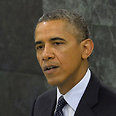
US President Barack Obama at UN General Assembly
צילום: AFP
Nukes and Palestine - Obama’s worktable
Analysis: In his UN address, American president created a logical connection between Tehran, Ramallah and Jerusalem
During his speech at the annual UN General Assembly meeting in New York, Obama spoke about the dialogue with Iran and then, immediately after that, about the negotiations between Israel and the Palestinians. He made it very clear – while stressing Israel’s need for security – that a peace agreement is necessary to ensure the establishment of a Palestinian state.
From Israel’s standpoint this is good news, but also bad: On the one hand the leaders in Jerusalem should be pleased that Obama clarified once again how determined the US was to prevent Iran from obtaining nuclear weapons. On the other hand, during Obama’s speech a logical connection was created between Iran, Ramallah and Jerusalem.
It was easy to interpret Obama’s hints: He wants to make it clear to the Arab world that the US is determined to advance an Israeli-Palestinian agreement. While Israel and the Palestinian Authority are refusing to address the negotiations, the American president revealed the content of the talks, thus sending a clear message to Benjamin Netanyahu’s coalition, and mainly to the rightist parties. The message is that the core issues – Jerusalem, refugees, borders, security and settlers – are being discussed during the talks between Tzipi Livni and her Palestinian counterparts.
The talks, Obama hinted, are focusing on the most important and explosive issues for both sides, both diplomatically and politically.
Those who hoped to terminate the peace process and stop the release of Palestinian prisoners through petitions signed by ministers and Knesset members can only be disappointed by what they heard from Obama. The process, it turns out, is in full swing, and despite the terror attacks and difficulties, it is dealing with the cardinal issues on the way to an agreement.
The large number of times Obama mentioned “Israel” and “Iran” (15 and 26, respectively) shows that these will be the two main issues Washington will focus its Mideast policy on in the near future. “Real breakthroughs on these two issues – Iran’s nuclear program and the Arab-Israeli conflict – would have a profound and positive impact on the entire Middle East and North Africa,” Obama said in his speech.
In his address, Obama extended his hand to diplomatic dialogue with Iran. Israel is concerned about the possibility that the US Administration and the West will move to a policy of complacency with regards to all the messages coming out of Iran, but it is clear also in Jerusalem - in light of the regime change in Tehran and the messages relayed by Iran’s newly-installed president, Hassan Rohani – that the diplomatic efforts must be exhausted.
Israel is not opposed to dialogue with Iran which may lead to a breakthrough in the nuclear crisis, but officials in Jerusalem fear the US may “soften” and work to lift the sanctions imposed on Iran, sanctions which – according to senior diplomatic and security officials – are crushing Iran’s economy and are dramatically influencing the Iranian regime’s position vis-à-vis its nuclear program.
In the days leading up to Obama’s speech at the UN, Israeli officials made it clear that the sanctions are effective and must be used against the ayatollahs’ regime. “The sanctions, coupled with a credible military threat, can influence the position of the regime, which wants to survive,” one official said.










